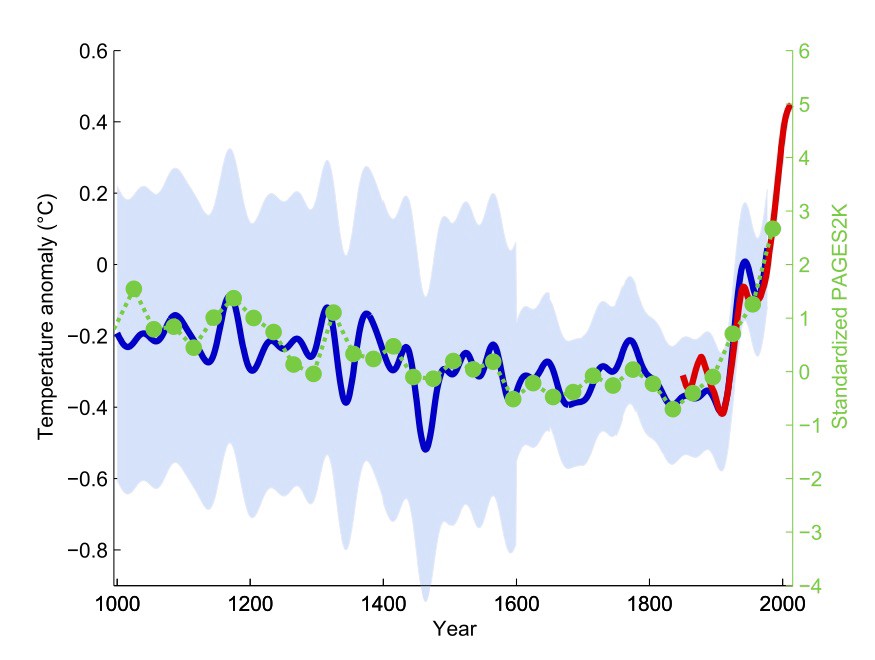Wetend to think of science and politics as existing in two separate spheres. Occasionally they intersect, like when a scientist shows up to Congress to deliver testimony or a politician blocks funding for the some vital research. But mostly they operate independently, right? Wrong. According to a study published last month in Global Environmental Change, the politics of climate denial has poisoned the waters of the scientific community, transforming the way that climatologists talk and even think about their own research. Facing “constant, and sometimes toxic, public challenges,” scientists overemphasize uncertainty while downplaying the risks of climate change.
“We all lose when scientists self-censor due to continued harassment.”
The study identifies several reasons for this response, but one in particular stands out: the looming specter of stereotype threat, the anxiety we feel when confronting an ugly stereotype about our group. Global warming deniers have cast climate scientists as alarmists. Climate scientists, in turn, have tried to buck this stereotype by emphasizing uncertainty. According to the study, the IPCC’s Fourth Assessment Report used the word “uncertain” or its derivatives more than 1200 times, while the word “know” and its derivatives appeared only 256 times.
Michael MacCracken, Chief Scientist for Climate Change Programs at the Climate Institute, explained that the fundamentals of climate change are clear. The uncertainties lie in the details. But uncertainty can be problematic for researchers trying to communicate the threat to the public and to policymakers eager to find weaknesses in the science. Said MacCracken, “I think the experience in this town, in Washington, is you have to have a response to everything.”

Exacerbating the problem is the fact that climate scientists brave enough to sound the alarm have often suffered severe backlash. Michael Mann, creator of the hockey stick graph (which tracks the sudden rise in global temperatures in dramatic hockey stick-shaped fashion), has endured death threats, powder-filled envelopes and calls for him to be stripped of his academic credentials. In 2009, Mann was the subject of a series of computer hacks that also ensnared his colleague Gavin Schmidt, Director of NASA’s Goddard Institute for Space Studies. Schmidt said the episode thrust him into a deep depression.
These kinds of incidents can ripple throughout the scientific community. Michael Halpern, head of the Center for Science and Democracy at the Union of Concerned Scientists, remarked that scientists are “more likely to keep their heads down… if they don’t feel that their peers who are attacked are adequately protected.” Halpern added, “We all lose when scientists self-censor due to continued harassment. We have a poorer understanding of the science and are less able to make good personal and policy decisions.”
James Hansen, former Director of NASA’s Goddard Institute for Space Studies, has been among the few scientists to embrace his duty as a public advocate. Hansen first entered the media spotlight while testifying before Congress on the threat of climate change in 1988 and 1989, and then much later for his arrest protesting the Keystone XL pipeline outside the White House. In 2007, Hansen warned of a “scientific reticence” preventing researchers from telling the truth about the threat of sea level rise, but the 74-year-old harbors no such discomfort. Hansen, along with 16 other researchers, recently announced that even 2 degrees C of warming could trigger runaway sea level rise.
Fundamentally, the problem of stereotype threat lies with those perpetuating the stereotype. Outspoken climate scientist Jason Box, who was profiled in the latest issue of Esquire, said, “We need the deniers to get out of the way. They are risking everyone’s future…. The Koch Brothers are criminals…. They should be charged with criminal activity because they’re putting the profits of their business ahead of the livelihoods of millions of people, and even life on earth.”
Jeremy Deaton writes for Nexus Media, a syndicated news service covering climate, energy, policy, art and culture. You can follow him @deaton_jeremy.

